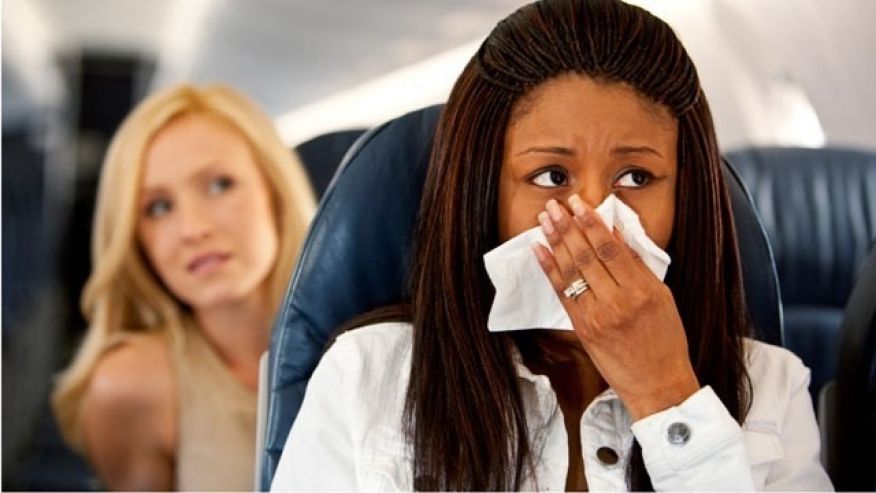
20 Feb Reader’s Question Answered: “Why Do I Feel Horrible After Long Flights?”
Well, the short answer is that the cabin pressure and humidity levels on airplanes are pretty different than what we’re used to. Your average comfortable humidity level for humans is 40-70 percent; most airplane cabin humidity levels are are well under that. And the barometric pressure during a typical plane ride is equivalent to that we’d feel while standing atop an 8,000-foot mountain. The exceptions are with the Boeing 787 Dreamliner that can maintain a pressure of 6,000 feet and humidity of 12-20% and the Airbus A380 seems to be in those numbers too. In airline terms that’s a pretty comfortable ride.
Humidity levels have to remain low on airlines to prevent moisture and corrosion inside the air-frame and high altitude. The Boeing 787 Dreamliner uses a lot of composite and carbon fiber components instead of metal which is why it can provide you with that comfortable higher level of humidity.
These factors of air pressure and humidity (or lack of) put unusual strain on our bodies, and basically cause us to become tired, gassy, zit-covered, headache-ridden beasts for the duration of our flight. And worst of all, there’s not a ton you can do about it — our bodies were simply not engineered to look and feel good while flying through the skies. It’s one thing to do a slow climb or slowly acclimate to those altitudes, but in a flight you rocket right up there almost instantly so your body goes a little haywire.
Some of the most common physical side effects of flying:
Headache: Though there’s plenty of oxygen in a fully airborne plane cabin, the air pressure keeps us from being able to fully absorb that oxygen that’s freely moving about the cabin into our bloodstream. This can lead to feelings of fatigue — and a horrible headache. In its more severe iterations, this fatigue and headache airplane combo is known as “altitude sickness.” Your best bet to combat this super common side effect is to come prepared with some Advil and stay hydrated. Drink a ton of water and get an aisle seat to use the restroom. You’ll feel a lot better.
Exhaustion: When a plane takes off, it doesn’t take in any fresh air until it’s fully airborne, and the recirculated air can make airplane passengers feel sleepy. Most airlines claim they maintain a 50:50 ratio of clean air to recirculated air, and some of the higher end luxury liners will increase that to an 80% fresh and 20% recirculated ratio. The more the fresh air, the more comfort of course, but for the airlines it really takes a chunk out of the fuel efficiency.
Gas & Stomach Pain: Flying causes gassiness and flatulence — the drop in pressure makes your bowel air volume increase, which can make you feel bloated and, well, gassy. Doctors don’t recommend holding it in until you land, but some obvious etiquette should go without saying — Get an aisle seat and pop over to the bathroom whenever you feel the urge rising up. Don’t be the person who just sits there and burns a hole through their seat and ruins the flight for everyone. It should also go without saying, but, I’ll say it: Avoid foods that you know are going to make you gassy 12hrs to 24hrs before you flight. The effects will only become exponential on a long flight.
Acne & Rashes: Low cabin humidity dries out your skin, which is why you might suddenly find your lips chapped or your cheeks flaky. But that low humidity will also actually cause oily skin to become oilier to compensate for the dryness, which can leave you landing with a face full of surprise zits. There’s no surefire cure, but drinking a lot of water and applying moisturizer both before and during the flight can at least give your skin a fighting chance. If you are prone, it’s tough to prevent, but at least now you know why it’s happening.
Dehydration: Our bodies get dehydrated from the airplane cabin’s low humidity levels, which can make us feel thirsty — as well as dry out the mucous membranes in our throats and sinuses, which can leave us not just feeling crappy, but also more vulnerable to illness. This low humidity level is what general leaves you feeling pretty crummy after a really long flight. There’s nothing to do to fight this one except drink a ton of water, and stay away from anything dehydrating, like booze or caffeine — so just make your peace with your aisle-adjacent seat mates now in case you find yourself crawling over them for 12 hours to use the restroom. At least you won’t land feeling sick and dried out.
